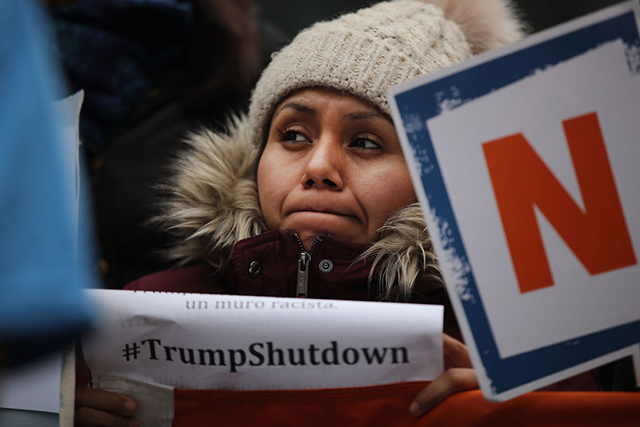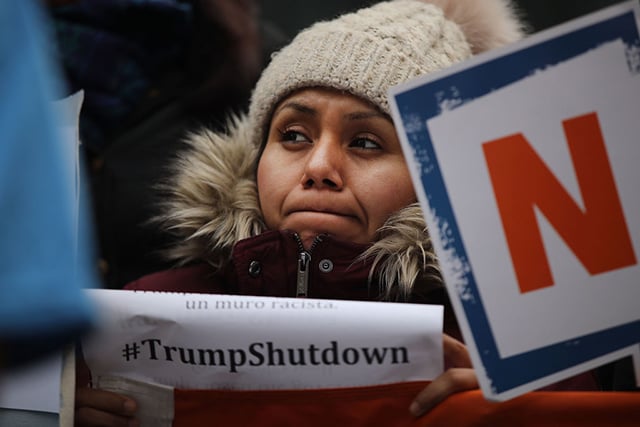
Honest, paywall-free news is rare. Please support our boldly independent journalism with a donation of any size.
 Demonstrators, many of them recent immigrants to the US, protest the government shutdown and the lack of a deal on Deferred Action for Childhood Arrivals outside of Federal Plaza on January 22, 2018, in New York City. (Photo: Spencer Platt / Getty Images)
Demonstrators, many of them recent immigrants to the US, protest the government shutdown and the lack of a deal on Deferred Action for Childhood Arrivals outside of Federal Plaza on January 22, 2018, in New York City. (Photo: Spencer Platt / Getty Images)
A year into the Trump experiment, political pageantry continues unabated. However, the lives and daily realities of 700,000 young people in the US are directly imperiled by this ongoing sideshow.
The January government shutdown is an example of an empty spectacle with a very real and very human cost. That cost includes the lives of Dreamers and the future of Deferred Action for Childhood Arrivals (DACA) legislation; in this case, Republicans are using many hundreds of thousands of human beings as a bargaining chip. Meanwhile, the president seems to be stoking the fires, remarking on Tuesday that if Democrats don’t accept his immigration plan, he’d “love to see a shutdown.” With the threat of another government shutdown looming, a number of other lives hang in the balance, too.
With another vote scheduled for February 8 — at which time another shutdown is possible — it’s time to come to terms with who, precisely, a shuttered government most affects. Many critics are focused on the short-term effects of our government shutting down, such as temporarily furloughed employees and the delay of US mail, but there are also longer-term impacts at stake.
When government shuts down, so do many of our safety mechanisms — including the Food and Drug Administration (FDA), Consumer Product Safety Commission (CPSC) and many other bureaucratic entities whose job it is to ensure safe products make it to market and unsafe ones are pulled from shelves immediately. We’re talking about prescription and over-the-counter drugs, medical devices and even food products; in these areas, even a brief lapse of judgment and oversight costs lives.
For instance, during the October 2013 government shutdown, only 22 out of the CPSC’s 500 employees remained at their positions. These few employees had the impossible task of weeding out only products that posed an “imminent threat” to the health of consumers.
In 2013, 20,000 patients reported serious complications from a blood thinner called Pradaxa. More than 1,000 Pradaxa patients died before the FDA responded by bundling together thousands of individual complaints and lawsuits into one multidistrict litigation case. Had any of this happened while the government was shut down, many more lives may have been lost. The judge tasked with the case “recommended” at the end of 2017 that the case be closed. Affected parties are now encouraged to seek representation on their own, without the strength of numbers.
The potential harm from a government shutdown also extends to patients who are waiting for new treatments to become available. There is an extensive approval process in place before new drugs, devices and treatments hit the market. In the event of a government shutdown, this approval process grinds to a halt. In instances where time is of the essence — as is often the case when patients receive discouraging prognoses — a government shutdown might make the difference between a patient receiving treatment before the worst comes to pass and waiting until it’s too late.
The federal government and its courts are also responsible for facilitating product liability lawsuits. Recent examples include the literally thousands of lawsuits brought against Johnson & Johnson alleging they knowingly sold talc-based products for years, despite strong links with various cancers. One high-profile lawsuit in California was thrown out late in 2017, but many more remain.
Johnson & Johnson also sold a drug called Risperdal under the false claim that it could address the symptoms of dementia, bipolar disorder and a variety of other psychiatric conditions — conditions for which it never actually acquired approval from the FDA.
As partisan politics delivers intermittent shutdowns, you’d be hard-pressed to find a demographic more likely to be affected than Native Americans. Western colonialism has painted the original people of this land and their cultures into a corner, to the point where keeping basic services operational often comes down to the availability of public grant money. In an average month, public funds provide healthful food to 76,500 Native Americans hailing from 276 tribes, for example.
In the 2013 shutdown, Native Alaskans saw vitally important grant money dry up — money they rely on to provide health care, schooling, ambulance and firefighting services, and tuition for Native children to attend college.
Most of these are not optional spending boondoggles for the federal government — they are obligations protected by treaty. While treaties are meant to ensure these expenditures, hundreds of them have been broken or changed by the US government — yet another step in the direction of destruction wrought by colonialism.
More than ever, the American people need to insist that our leaders remain fiercely in defense of all people. Government shutdowns, like partisan politics, appear as pageantry — but they have real consequences, and often for people without the means to defend themselves or even publicize their situation.
Shock politics and partisan gridlock would be a lot rarer if we insisted on voting for leaders who value people first and their own job security a distant second.
Press freedom is under attack
As Trump cracks down on political speech, independent media is increasingly necessary.
Truthout produces reporting you won’t see in the mainstream: journalism from the frontlines of global conflict, interviews with grassroots movement leaders, high-quality legal analysis and more.
Our work is possible thanks to reader support. Help Truthout catalyze change and social justice — make a tax-deductible monthly or one-time donation today.